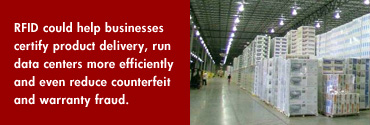
by Jamie Beckett
RFID technology is already helping businesses like HP run their supply chains
more efficiently – reducing costs, uncertainty and risk while increasing
visibility, speed and accuracy. But that's just the beginning, says Dick Lampman,
senior vice president for research, HP, and director of HP Labs.
Lampman says that RFID, or radio frequency identification technology – combined
with other technologies being developed at HP Labs – has the potential
to help businesses certify product delivery, run their data centers more efficiently
and even reduce the growing problems of counterfeit and warranty fraud.
"In the future, RFID will be combined with other sensors into a wireless, secure,
self-configuring and self-healing network," he said. "Customers
will reap incredible visibility, flexibility and efficiency into their operations."
Lampman is one of 15 members of the Board of Governors of EPCglobal, a not-for-profit
group setting industry protocols and specifications for the Electronic Product
Code, the next generation in product identification. He spoke recently to business,
academic and government leaders at the Third International EPCglobal and RFID
Summit in Beijing.
HP has an incredibly complex supply chain. It has customers in more than
170 countries and conducts business in 43 currencies and 15 different
languages. The company touches 45 million consumers a month in
retail and last year sold consumers 53 million products.
"HP obviously demands a global supply chain that is cost-efficient
and flexible," Lampman noted. The company was an "early
adopter" of RFID, commencing trials in 2002 with the goals
of saving money, reducing risk, increasing supply-chain agility
and better serving customers.
"This year alone, we anticipate that we could ship more than one
million HP consumer products with RFID tags," Lampman said. "We
have the capacity and expertise to do this and we plan to continue
growing and investing in this technology -- more than $150 million
over the next five years."
The company is now implementing or working to implement RFID
in about 30 manufacturing sites worldwide -- possibly one of the
world's largest RFID implementations.
In addition, HP is putting its experience to work for customers,
providing services for businesses that want to implement RFID
today and providing RFID-enabled goods to customers.
HP also is pursuing research in RFID and sensing technologies,
creating systems aimed at allowing businesses to track and monitor
products they've purchased. In one project, researchers are working
to allow IT operators to automatically track the location and temperature
of servers in a data center.
In addition, scientists are developing software algorithms that
make networks of RFID readers and other sensors both resilient
to failure as well as tolerant to intrusions.
"Researchers are developing an intelligent network of sensors that
will create an adaptive, secure and easy-to-manage sensing infrastructure
-- one that turns data centers into Smart Data Centers and warehouses
into Smart Warehouses," Lampman said. "We have just scratched
the surface in terms of what we can do with this technology."
By gaining the ability to automatically track and trace products,
businesses may also gain a tool that helps them keep counterfeit
goods out of the supply chain, Lampman said. Although pharmaceutical
companies are pursing this, other industries – including
cost-sensitive high-tech – could benefit.
RFID could also help businesses more confidently prove delivery of
products – an essential part of trading between the shipper
and customer.
"RFID is a technology with tremendous potential," Lampman
said. "It will take us to the next level in terms of quality
and speed."
|